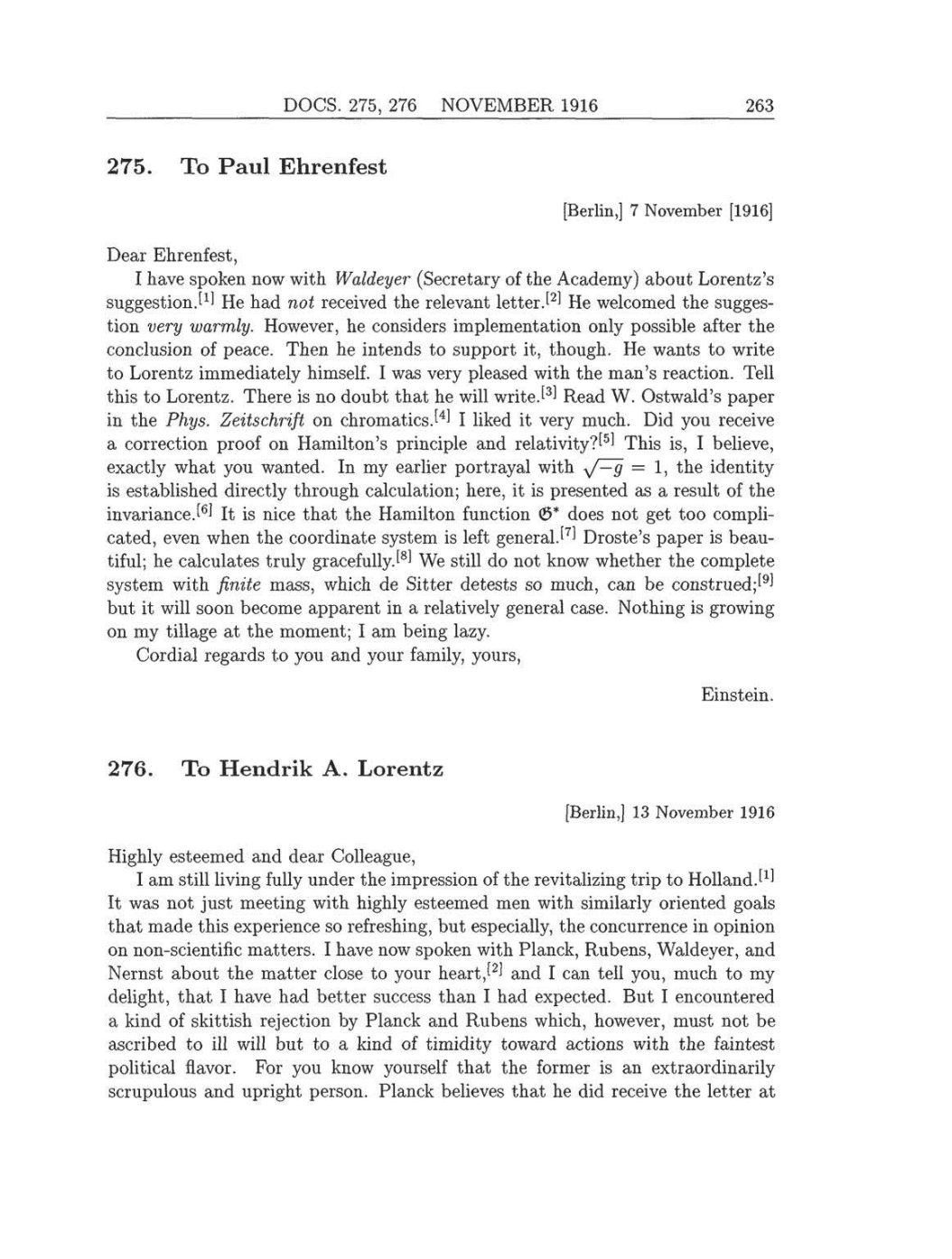DOCS.
275,
276
NOVEMBER
1916 263
275. To Paul Ehrenfest
[Berlin,]
7 November
[1916]
Dear
Ehrenfest,
I
have
spoken
now
with
Waldeyer (Secretary
of the
Academy)
about
Lorentz’s
suggestion.[1]
He
had not
received
the
relevant
letter.[2] He
welcomed
the
sugges-
tion
very warmly.
However,
he considers
implementation only possible
after the
conclusion
of
peace.
Then he intends
to support it,
though.
He wants
to write
to Lorentz
immediately
himself.
I
was
very pleased
with
the
man’s reaction. Tell
this
to Lorentz. There
is
no
doubt that
he
will write.[3]
Read W. Ostwald’s
paper
in
the
Phys. Zeitschrift on
chromatics.[4] I
liked
it
very
much. Did
you
receive
a
correction
proof
on
Hamilton’s
principle
and
relativity?[5]
This
is,
I
believe,
exactly
what
you
wanted. In
my
earlier
portrayal
with
/-g
=
1,
the
identity
is
established
directly
through
calculation; here,
it is
presented as
a
result
of
the
invariance.[6]
It
is nice
that
the Hamilton function
R*
does
not
get
too
compli-
cated,
even
when
the
coordinate
system
is
left
general.[7]
Droste’s
paper
is
beau-
tiful;
he calculates
truly
gracefully.[8]
We
still do
not
know whether
the
complete
system
with
finite
mass,
which de
Sitter
detests
so
much,
can
be
construed;[9]
but it
will
soon
become
apparent
in
a relatively general case. Nothing
is
growing
on
my
tillage
at
the
moment;
I
am
being
lazy.
Cordial
regards
to
you
and
your
family,
yours,
Einstein.
276. To
Hendrik A. Lorentz
[Berlin,]
13
November
1916
Highly
esteemed and dear
Colleague,
I
am
still
living fully
under
the
impression
of
the
revitalizing
trip
to
Holland.[1]
It
was
not
just
meeting
with
highly
esteemed
men
with
similarly
oriented
goals
that
made
this
experience
so
refreshing,
but
especially,
the
concurrence
in
opinion
on
non-scientific
matters. I
have
now
spoken
with
Planck, Rubens, Waldeyer,
and
Nernst
about the
matter
close
to
your
heart,[2]
and
I
can
tell
you,
much to
my
delight,
that
I
have had better
success
than
I had
expected.
But
I encountered
a
kind of
skittish
rejection
by
Planck and Rubens
which, however,
must not be
ascribed to
ill will
but
to
a
kind of
timidity
toward actions with
the
faintest
political
flavor. For
you
know
yourself
that the
former
is
an
extraordinarily
scrupulous
and
upright
person.
Planck
believes
that
he
did receive
the letter
at
